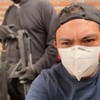Tamarindo, Costa Rica. Photo by Federico Meneghetti/REDA&CO/Universal Images Group via Getty Images.
Costa Rica’s government is boosting police presence on the streets and tougher laws against drug and weapons trafficking as homicide rates explode in this once-peaceful nation.The Central American nation—one of the few countries in the world without an army—has long been a popular tourist destination due to its peaceful, happy reputation. The country has in the past been called the happiest country on earth. But it’s now a major hub for drugs headed for the U.S and Europe, homicide rates are reaching record levels, and the government of President Rodrigo Chaves is struggling to contain the violence. For decades Costa Rica has been a transit country for drugs coming from nations like Colombia or Ecuador. But in recent years international drug traffickers have settled in, making it an important hub to stash and produce drugs, according to officials. Its domestic consumption of illegal drugs has also more than doubled, says a recent report by the United Nations.“I want people to be able to walk peacefully in the street, that kids go to the park safely, that children go to school without fear that at any moment they could be caught in the middle of a shootout,” President Chaves said on Wednesday during a public speech in San José, Costa Rica’s capital city. “We will go against corrupt officials, drug traffickers and we will succeed in setting fire to all of this,” Chaves said.Over the last decade, decade homicides have increased by 66 per cent, according to official figures. The country sees at least one murder every 13 hours. The same figures show that more than 70 percent of those killings are related to drug trafficking. Chaves said that gangs are now recruiting children to work for them because they face lighter legal penalties if they commit crimes. “We need the ability to prosecute minors as adults for related to organized crimes,” he said. Previously, Mexican drug cartels would pay Costa Rican gangsters to help move small boats carrying loads of cocaine from Colombia. But in recent years, cartels began paying their local colleagues in cocaine, opening a new market for gangs, according to Costa Rica’s deputy security minister and Coast Guard chief, Martín Arias. “The Mexican narcos said, ‘We’re not going to use money; we’re not going to leave the trail that money leaves in banks, in systems; we’re going to pay in cocaine,’” Arias told the AP in a previous interview. Ecuador has seen a similar trend. Mexican cartels have exported their drug war to the South American country which borders Colombia, the world’s biggest cocaine producer, and turned it into a war zone.
Advertisement
Advertisement
